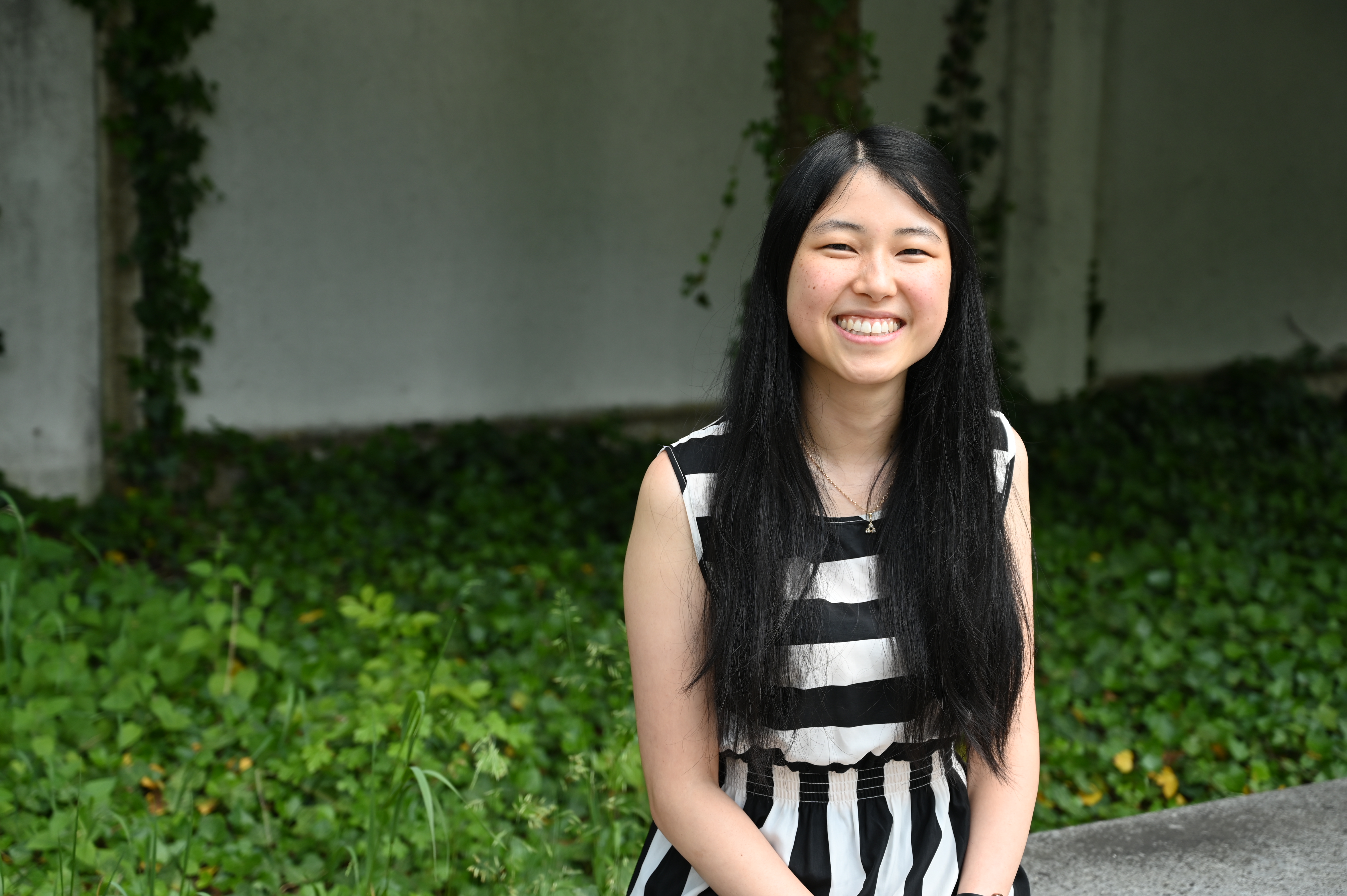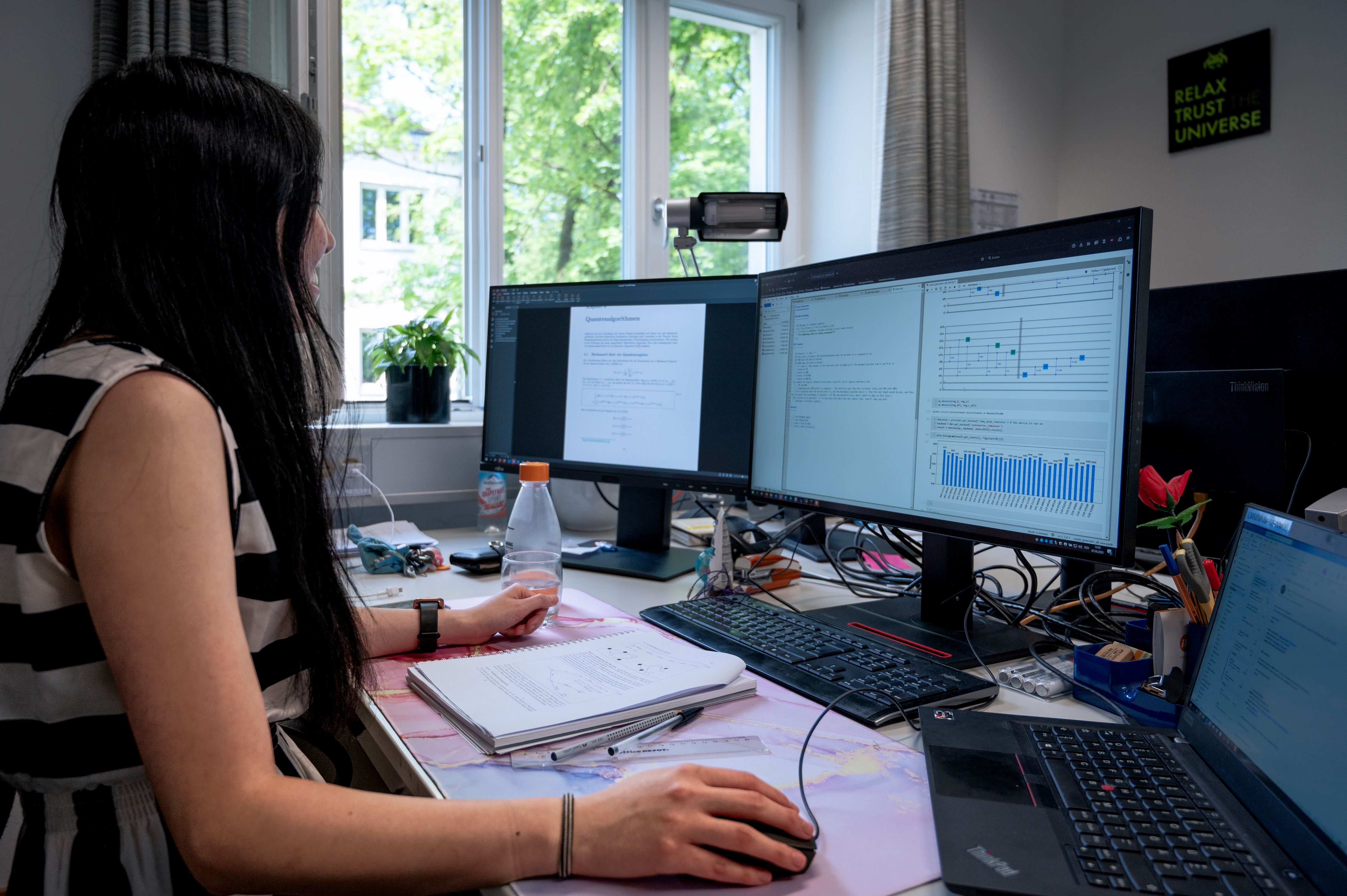"I know my work is good for something"
Making quantum algorithms more accessible
As part of Munich Quantum Valley, Xiao-Ting Michelle To feels she is making a meaningful contribution to a great endeavor. With her research, she wants to simplify the complexity of quantum algorithms for users.
By Veronika Aechter
The Institute of Computer Science at the Ludwig-Maximilians-Universität München (LMU) is almost hidden in the expanse of the English Garden. In Xiao-Ting Michelle To's office, you can hear the soft sound of brass band music wafting from the Chinese Tower. From her window, she looks directly into the green. "I love this view," she says enthusiastically. "We're thinking of building a little house with nuts for all the squirrels." Not a bad place, then, to work on her doctorate in quantum computing.
That the 25-year-old ended up with a quantum topic was more of a coincidence. "When I was looking for a topic for my bachelor's thesis, I had no real idea what quantum computing even was," she says. But her bachelor's thesis, which focused on a topic related to quantum annealing, drew Michelle in. "I just thought it was cool thematically, and when I started my master's in computer science the next semester, I saw that there was a lecture offered on the introduction to quantum computing," she says. After that, she searched specifically for all the seminars and internships that dealt with quantum computing. "And now here I am!" says Michelle, laughing.
After graduating from high school, it wasn't clear to Michelle that her path would lead in this direction. But she always knew she wanted to study, and that she wanted to come to LMU to do so. In the end, she decided to study computer science because she had already enjoyed it a lot when she was in high school. She can't really say why she was so attracted to LMU of all places – but it probably has something to do with a school trip: "We also visited LMU on this trip. I thought the building was so beautiful, it convinced me," she says with a smile. In addition, she says, family is very important to her and she was keen to stay close by for her studies.
Michelle commutes every day from Erding to the institute at the English Garden. "Of course it's a distance, but I think it's okay," she says. It takes her a full hour, but the time can be put to good use for things she wouldn't otherwise get to do. Listening to podcasts, for example, or pursuing her new hobby: "I just started crocheting," she laughs, "that's a good way to balance things out." Especially during the long phases with obligatory remote work, she had actually missed the drive.
Hiding complexity from users with Quantum Algorithmic Skeletons
Even if access to the quantum world was difficult for her at first – "I don't think anyone understands it 100%" – the computer scientist is delighted that everything can ultimately be written down and proven mathematically. That scientists can also take advantage of quantum computers without having to deal with complex quantum programming at the gate level is what drives Michelle in her research.

Xiao-Ting Michelle To, 25
Position
Ph.D. student
Institute
LMU - Institute for Computer Science
QACI
Degree
Computer Science
Michelle's research focuses on "Quantum Algorithmic Skeletons". These are intended to make the complexity of quantum algorithms at the gate level invisible to programmers and thus enable their application to a broader field.
As part of her doctorate, she is working on so-called quantum algorithmic skeletons. "In principle, the aim is to hide the complicated quantum properties from programmers," explains the doctoral student. In the end, users with basic knowledge of quantum algorithms should be able to work with more abstract, simpler formulations. The fact that Michelle, as a member of Munich Quantum Valley, is a part of a big whole motivates her even more: "I just know that my work as part of this big project is good for something. In the end, my part may not be directly visible, but you know that you did something in the background that helped. I think that's cool."
She also appreciates the exchange that particularly the review meeting last fall produced. There, she said, she met people working on similar things to her, primarily quantum programming. "We still have regular meetings where we discuss what we are currently working on. Especially with the people from TUM, I would never have gotten in touch with them otherwise."
Taking on new perspectives
The contact with her colleagues in the research group is also what helped the doctoral student most at the beginning of her doctoral studies. "Especially at the very start, you're still a bit lost, you first have to figure out how best to structure your work and set priorities," she says. It helps that she gets along so well with her team and knows she can always ask for help. Outside of work, her group also gets together for activities. They just went hiking together: "My muscles are still sore because I'm not used to it," says Michelle. But it was still fun. In her free time, the 25-year-old likes to take it easy, playing games and watching shows. "I also like to go for walks a lot," she adds, "but that's no comparison to mountain hiking."
Even though Michelle describes herself as a homebody – her semester abroad in Hangzhou, the "Silicon Valley" of China, just under 200 kilometers from Shanghai, proves otherwise. Michelle's family is originally from China, but she had never been there herself before her semester abroad and "only" speaks a Chinese dialect, as she explains. At LMU, she already took a course in Mandarin before deciding to get to know the country and the language even better. "That just really suited me then – to go and explore it and learn something at the same time motivated me." When asked to describe her time in China, one aspect in particular comes to mind: everything is very different! "I liked the fact that you are completely immersed in a different world. For me as a Chinese, the culture shock was maybe not quite as big, but it was something completely new for me, too." And now she can speak Mandarin, too.
The doctoral student also hopes for new perspectives from her research. More people should dare to get to grips with quantum programming without having to delve too deeply. "Maybe others can still discover something new if they look at a problem from a different angle. We're all in such a low-level perspective now, but you might just get some good ideas if you're not quite that deep." This can be taken as a clear call to the Quantum community to network with each other beyond their own horizons.
Published 21 July 2023; Interview 07 June 2023
